Listening to researchers: Are the Recherche Data Gouv services useful?
For the first time during the Recherche Data Gouv ecosystem seminar on November 21, 2024 in Nancy, a round table was held giving the floor to researchers.
On the menu: Listening to researchers: are the Recherche Data Gouv services useful?
With :
- Alexis Arnaud, atelier de la donnée Université Grenoble Alpes ;
- Laetitia Bracco, responsable de l'atelier de la donnée ADOC Lorraine ;
- Julien Gossa, maître de conférences, laboratoire SAGE, Université de Strasbourg ;
- Richard Moreno, responsable de la plateforme Nationale des données de la recherche, INRAE ;
- Pablo Ruiz Fabo, maître de conférence, Laboratoire LilPa, Université de Strasbourg ;
- Christine Da Silva-Genest, maîtresse de conférence, UR 3450 DevAH & UMR 7118 ATILF, Université de Lorraine ;
- Brigitte Vigolo, chercheuse, Institut Jean Lamour, Université de Lorraine-CNRS.
Médiation : Véronique Stoll, Co-pilote du collège données du comité pour la science ouverte.


The discussions highlighted 4 strong trends. Illustrated by selected pieces heard during the round table:
1 - Data sharing is not obvious to research communities and the data management plan, although considered useful, is still seen as very time-consuming.
Christine Da Silva-Genest: As part of a project funded by the National Research Agency, making a Data Management Plan (DMP) is an obligation.
Brigitte Vigolo: In my community, DMPs are published because they have to be, but in reality it is not in our practices. In this sense, Lætitia Bracco (ADOC Lorraine data workshop) saved me time.
Pablo Ruiz Fabo: I did not make a DMP, it was not yet mandatory, nevertheless I regret it. I did not promote certain datasets because it was not planned, in hindsight I tell myself that it would have been useful. I now have a current project where it is mandatory, it motivates me.
Julien Gossa: The implementation of the principles of open science affects the professional organization and the careers of researchers, sometimes representing an obstacle to its adoption.
>> The ANR is setting up a data management plan for projects funded from 2019.
2 - The opening of data is not yet fully associated with a feeling of trust.
Christine Da Silva-Genest: Many people wonder: How will the data downloaded by others be used, and why? In particular, health data for example. We wonder about the guarantee that Recherche Data Gouv provides.
Lætitia Bracco: The question of security is frequent. We reassure by explaining the location of the servers, the technical criteria for backup, the possible access methods. To this, we often add a reminder on the difference between sharing and opening, closed and restricted access, the advantages brought by opening data, etc.
>> How is the data secure? - Response from Stéphane Paris in January 2023.
3 - Recherche Data Gouv helps to structure support services and provides a federated gateway to the publication of data.
Brigitte Vigolo: Without Recherche Data Gouv, I don't know where or even if I would have deposited data, because I only know this repository.
Lætitia Bracco: Recherche Data Gouv allowed us to better understand the data players on the Lorraine university site. In particular, we were able to get closer to Inria, AgroParisTech and the CNRS, expand our network of data ambassadors and share it with existing data referent networks. In the end, we were also able to exchange best practices with other systems, in regions or nationally. This is a scaling up that benefits the support teams.
Alexis Arnaud: Support already existed in Grenoble. However, Recherche Data Gouv played the role of accelerator. We saw the opportunity to (re)think, to expand our initiatives on the local perimeter while perpetuating our relationships and better understanding our position within a national ecosystem.
>> Discover the local support services via the data workshop map.
4 - Recherche Data Gouv encourages the adoption of good practices.
Christine Da Silva-Genest: Our missions and habits remain the same. However, today we note a better anticipation of data processing, of thinking about metadata in advance. In other words, Recherche Data Gouv provided us with good practices and clarified the possibilities available to us.
Alexis Arnaud: One of the aspects of support is to raise awareness, make data deposit understandable and accessible. In other words, scientists are encouraged to anticipate the reuse of data by others and not simply associate the deposit with the sole need for a DOI.
Pablo Ruiz Fabo: Citations are an important element for researchers, whether they are citations of articles or datasets. Recherche Data Gouv, by offering download and visualization indicators, helps to have a slightly more concrete idea of the impact of data when they are published.
Richard Moreno: The future Recherche Data Gouv catalog will include tools to discover datasets, different from the classic approach (a Google-style text insert). The user will be able to search for a theme and will obtain the datasets related to this theme.
Julien Gossa: Recherche Data Gouv was also created to respond to issues of sovereignty and reproducibility. Having deposited in the right repositories is crucial.
>> Discover the Recherche Data Gouv repository and trusted repositories.
